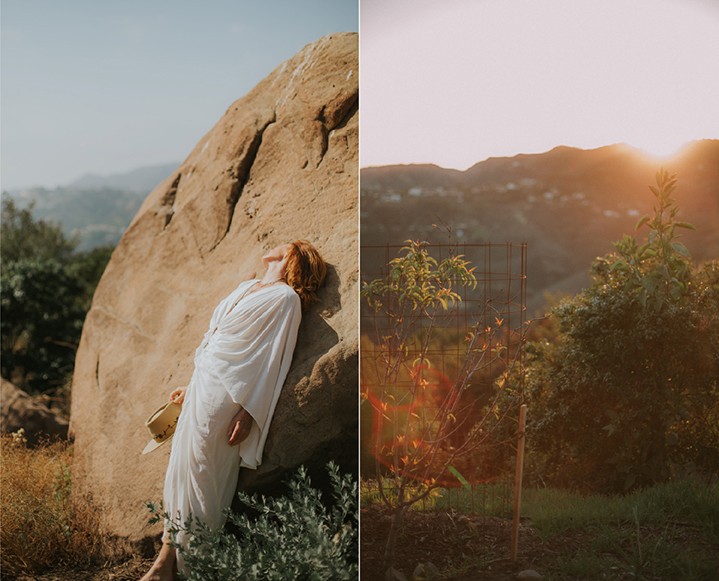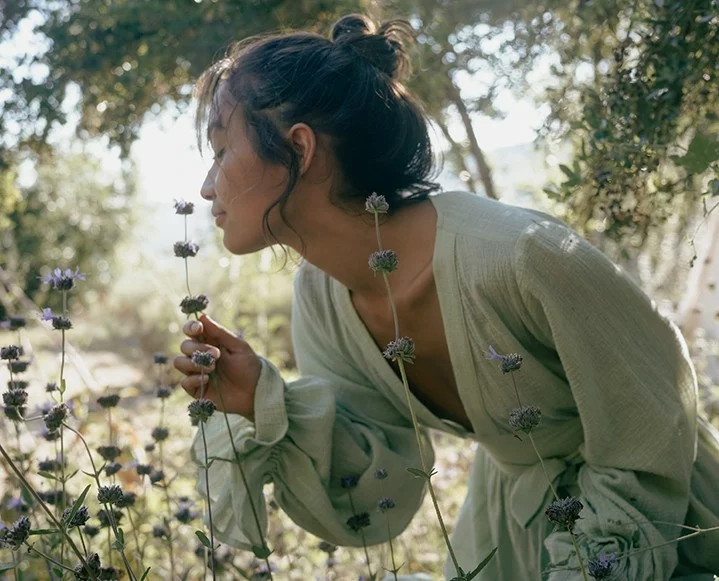FINALLY, SPRING HAS SPRUNG.Towards the end of winter, we can’t help but start to pull at our turtlenecks, fighting eagerly to shorten our sleeves, go for a hike, and watch the sun go down at 7pm. However, as the seasons change, so do our physical, emotional, spiritual, and mental needs.
In an effort to be more ceremonial about our lives and bring in a more grounded yet productive spring season (during a very ungrounded Aquarian year), we turned to none other than the very wise and whimsical Founder of RITUEL, Eve Gaines. We first met Eve during an iconically transformative one-day wellness sabbatical on the bluffs of Topanga Canyon last year (and are still gushing about it).
Having explored the depths of the spiritual, psychological, anthropological, emotional, and physical, Eve is a seasoned ceremonialist with a deep love of curating ceremonies and creating beautiful and meaningful lifecycle rituals (which she believes we don’t perform enough of in American society). She holds an honors degree in medical and psychological anthropology with a focus on rites and rituals as well as a masters in organic design and sustainable architecture, which she has leveraged into every facet of RITUEL. Eve also studied eco psychology and learned traditional healing practices from elders in a myriad of traditions.

The Spring Equinox Explained By Ceremonial Rites Expert + Rituel Founder Eve Gaines
The Spring Equinox is a fascinating cosmological phenomenon that marks a significant moment of balance and transition in the celestial calendar. As the Earth orbits the Sun, there comes a point where the tilt of its axis aligns perfectly, resulting in nearly equal lengths of day and night. This celestial alignment heralds the arrival of spring, bringing with it a sense of renewal and rejuvenation. It’s a time when the sun crosses the celestial equator, ushering in longer days and shorter nights, and setting the stage for the awakening of nature after the dormancy of winter.
The Spring Equinox is a reminder of the interconnectedness of all things in the universe and the cyclical nature of life, inviting us to pause and marvel at the beauty and harmony of the cosmos.This moment on the wheel of the year, when the length of day and night is equal, has been recognized throughout history and across cultures as a potent time of renewal and rebirth.
During this period, we may experience a renewed zest for life, akin to the intoxicating sensation often referred to as “Spring Fever.” It’s a time of reemergence, where a new version of ourselves is formed after the introspective winter months.
It is also the beginning of the astrological year, as we shift into Aries season—the first sign of the zodiac—associated with the attributes of adventure, courage, and passion. Aries is a fire sign and brings with it the spark of inception. The energy of this seasonal shift can feel initiatory. It elicits new beginnings, potentiality, renewed energy, and inspiration. It signifies a time of awakening and rejuvenation as the natural world bursts forth with new life.
I hope it is a time of blossoming for you—of new possibilities and of a sense of fresh authority in your own life. May it kindle within you a sense of aliveness, propelling you towards your own rebirth, as you recognize that the next version of yourself, nurtured during the introspective and darker winter months, is awakening and ready to emerge.

Architectural Monuments That Align With The Spring Equinox
The architectural marvels of ancient civilizations bear witness to the reverence for the equinox.
Stonehenge, which is located in Wiltshire, England, is perhaps the most famous prehistoric monument in the world. Its construction began over 5,000 years ago, and it underwent several phases of development over the centuries. During the Spring Equinox, the rising sun aligns perfectly with the Heel Stone, an upright stone just outside the main circle of stones. This alignment creates a dramatic effect as sunlight floods into the center of the monument, illuminating the central altar stone. Archaeologists believe that Stonehenge served as a ceremonial and astronomical site, with its alignments possibly marking significant events in the solar and lunar calendars. The alignment with the Spring Equinox suggests that the monument played a role in rituals or celebrations associated with the changing seasons and the renewal of life.
The Mayan monument at Chichen Itza is located in present-day Mexico, is renowned for its remarkable architectural and astronomical significance. On the Vernal Equinox, a fascinating phenomenon occurs at this ancient site, where a shadow resembling an undulating serpent emerges on the main staircase of the pyramid, known as El Castillo or the Temple of Kukulkan. The shadow’s appearance is not a mere coincidence but a deliberate design by the Mayan architects, who possessed advanced knowledge of astronomy and celestial cycles. The phenomenon symbolizes the serpent god Kukulkan, also known as Quetzalcoatl in Aztec culture, descending from the heavens to bestow his blessings upon the earth.
The Great Pyramid of Giza showcases an impressive alignment with astronomical phenomena. The overall alignment of the pyramids at Giza with cardinal directions and celestial bodies does indicate the ancient Egyptians’ sophisticated understanding of astronomy and their reverence for cosmic symbolism. Similarly, the Sphinx, situated near the Great Pyramid, holds symbolic significance in Egyptian mythology. While its precise alignment with the rising sun on the equinox is subject to debate among scholars, the orientation of the Sphinx does suggest an awareness of celestial cycles and their spiritual importance in ancient Egyptian culture. The Sphinx’s association with the sun god Ra further underscores its connection to cosmic symbolism and the cycle of life and death.

Cross-Cultural Celebrations
There are many cultural celebrations that highlight the diversity of human traditions and the universal themes of renewal, rebirth, and gratitude for the gifts of nature. Through rituals, customs, and communal gatherings, people around the world come together to honor the changing seasons and celebrate the abundance of life.
Ostara is a modern Pagan festival celebrated around the Spring Equinox. The holiday honors Ostara, the Germanic goddess of spring and fertility, whose name derives from the same root as the word “Easter.” It marks the awakening of the earth from winter’s slumber and the return of life. Rituals and customs associated with Ostara include decorating eggs, symbolizing fertility and new life, and planting seeds to symbolize growth and renewal.Other practices may include lighting bonfires, feasting on seasonal foods, and participating in outdoor rituals to honor the changing of the seasons.
Easter and Passover‘S observance is determined in alignment with the equinox. The date of Easter, which commemorates the resurrection of Jesus Christ on the third day after his crucifixion, varies each year but typically falls on the first Sunday after the first full moon following the Spring Equinox. The Jewish holiday of Passover is also timed in accordance with the Spring Equinox. It signifies a remembrance of renewal and liberation.
As Jews gather for the Seder, they retell the story of Exodus from Egypt, symbolizing freedom and justice. It is a time of coming together with loved ones to celebrate resilience and hope amidst the beauty of nature’s rebirth. It’s a time to reflect on the values that bind us and look forward with optimism to the blessings of freedom and renewal.
Norwuz is the Persian New Year and celebrated by millions of people worldwide, particularly in Iran, Central Asia, and parts of the Middle East. The holiday marks the beginning of spring and the first day of the Persian calendar, typically falling on or around the Spring Equinox. Norwuz traditions include cleaning and decorating homes, visiting family and friends. Other customs may include jumping over bonfires, reciting poetry, and playing traditional games to welcome the new year with joy and prosperity.
Hanami meaning “flower viewing,” is a traditional Japanese custom associated with the blooming of cherry blossoms, or sakura.The practice dates back centuries and typically occurs in late March or early April, coinciding with the Spring Equinox.During Hanami, people gather in parks and gardens to enjoy the beauty of cherry blossoms, holding picnics and socializing under the flowering trees. Hanami represents a time of renewal and appreciation for the fleeting beauty of nature, with cherry blossoms symbolizing the transient nature of life and the impermanence of beauty.

Ways To Honor The Start Of The Spring Season
ExplorE Nature | Honoring the correspondence of what is happening seasonally in nature and recognizing how our own personal rhythms and cycles mirror this cadence. Seize the opportunity this powerful seasonal shift presents to us. Start by creating a nature journal where you document the changes you observe in your surroundings as spring unfolds. Note the emergence of new leaves, the blooming of flowers, and the return of migratory birds.
Dedicate time each day for quiet reflection and observation. Find a peaceful spot in nature or sit. Practice mindfulness meditation, focusing on your breath and the sounds of nature around you. Research local botanical gardens, nature reserves, or parks that showcase the beauty of spring. Plan day trips or weekend getaways to explore one of these natural sanctuaries.
Pack a journal, camera, and field guide to document your outdoor adventures. Take notes on the flora and fauna you encounter, capturing the fleeting beauty of spring blooms and wildlife sightings. Engage your senses by listening to birdsong, feeling the texture of tree bark, and inhaling the fragrant scents of wildflowers. Practice mindfulness as you walk, focusing on each step and breath.
Embrace spontaneous exploration by following your intuition and curiosity. Wander off the beaten path, allowing yourself to discover hidden gems and secret wonders in your surroundings.
Spring Clean | Begin by setting intentions for your spring cleaning ritual. Reflect on what areas of your home or life could benefit from renewal and decluttering. Create a cleansing ritual by smudging your home with sage or palo santo, focusing on areas that feel stagnant or heavy. Open windows to allow fresh air to circulate and invite positive energy into your space.
Declutter one room at a time, sorting items into categories such as keep, donate, or discard. Let go of belongings that no longer serve you, creating space for new opportunities and experiences. Deep clean your home using natural cleaning products infused with essential oils such as lemon, lavender, or eucalyptus. Cleanse surfaces, floors, and windows, infusing your home with a sense of freshness and vitality.
plant seeds | Equinox was a time of planting new seeds in many agrarian civilizations. You can continue this tradition in your own life. Start by researching which plants thrive in your local climate and soil conditions. Choose seeds that resonate with your intentions for the season, whether it’s herbs for culinary creativity, flowers for beauty and joy, or vegetables for nourishment and sustainability. Create a dedicated space for gardening, whether it’s a backyard garden, raised beds, or indoor planters. Prepare the soil by adding compost or organic fertilizers to provide nutrients for healthy growth.
Plant seeds according to their specific requirements for sunlight, water, and spacing. Follow planting guides and timelines to ensure optimal conditions for germination and growth. Cultivate a daily gardening practice by watering, pruning, and tending to your plants with care and attention. Take time to observe the miracle of growth and transformation as your seeds sprout and thrive.
connect with community | Plan a spring gathering or potluck with friends, family, or neighbors to celebrate the equinox together. Choose a theme that honors the spirit of renewal and connection, such as a garden party or picnic in nature. Create meaningful rituals or ceremonies to deepen your bond with loved ones and community. Consider activities such as storytelling circles, gratitude circles, or group meditation sessions.
Foster a sense of belonging and support by inviting each person to share their intentions or aspirations for the season ahead. Encourage open dialogue and active listening, nurturing a space of mutual respect and understanding. Extend your circle of connection beyond human relationships to include the natural world. Consider volunteering for environmental restoration projects or participating in community clean-up events to give back to the earth and its inhabitants. By engaging in these practices, you can harness the energy of the equinox to cultivate a deeper connection to nature, yourself, and your community, fostering growth, renewal, and resilience.
Spring into a transformative season ahead with a special 15% off of any of the programs featured at RITUEL’s stunning property—Rituel Ceremonies, Group Immersions, Wellness Day Retreats or Wellness Sabbaticals. Usher in the next (better) version of yourself with code CHALKBOARD15. Good through April 30, 2024.














